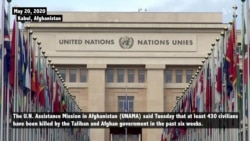A string of violence against civilian targets in Afghanistan this month has set off a debate over the fate of the U.S.-brokered peace deal, with some experts warning that brutal onslaughts such as the Kabul maternity ward attack put the fragile peace process at risk.
The May 12 gunman assault on Dasht-e-Barchi maternity ward in Kabul has left at least 24 people dead, including 16 mothers. Appalled by the unprecedented attack, the Afghan government vowed to avenge the deaths by changing its posture from defensive into offensive against the Taliban.
Scott Worden, the director of Afghanistan and Central Asia programs at the U.S. Institute of Peace (USIP) in Washington, told VOA that the maternity ward attack means the Afghan government will have a difficult time to make “some sort of concessions to an insurgent group while such atrocities are happening.”
The maternity hospital incident, charged Worden, fits the patterns of an IS attack. However, “it is true that the Taliban insurgency creates opportunities and space for groups like IS to operate.”
He said that the Taliban should provide assurance that it would reduce violence in order to create “an atmosphere that is conductive to talks.”
The Taliban has denied involvement in the maternity ward raid, and the U.S. has blamed the Islamic State for it. IS remained silent on the attack but claimed responsibility for the Nangahar funeral assault on the same day that left more than 50 people dead.
Regardless of the U.S. position, Afghan officials insist that the Taliban were implicated in some way.
Haqqani network
Ahmed Zia Saraj, chief of Afghanistan’s intelligence agency, said Monday in a news conference that his government has intelligence information showing that the Haqqani network, a faction of the Taliban, was also involved in the attack.
It was soon clear after the attack that subsequent events could lead to more escalation. President Ashraf Ghani ordered Afghan forces to resume their offensive against the Taliban. The group, in response, stepped up attacks on government forces across the country.
According to Sher Jan Ahmadzai, director of Center for Afghanistan Studies at the University of Nebraska, Omaha, even if IS group is found to be behind the Kabul hospital attack, most Afghans consider the Taliban to be mainly behind unrest in the country.
“If more attacks like this take place, Taliban’s leadership would be held accountable,” he told VOA.
The U.N. says it is “deeply concerned” by the rising violence in Afghanistan in recent weeks. Despite the U.S-Taliban agreement in late February, the U.N. Assistance Mission in Afghanistan estimates at least 430 civilians have been killed and injured by Taliban and Afghan forces in the last six weeks.
To salvage the peace deal signed with the Taliban, the U.S. envoy Zalmay Khalilzad has asked both sides not to fall into “that trap” but instead work together against terrorist groups like IS.
Khalilzad on Wednesday confirmed meeting with President Ghani in Kabul following another “constructive meeting” with senior Taliban leaders in Doha. He said he discussed in the meetings the need for reducing violence towards a permanent ceasefire and implementing the U.S.-Taliban agreement.
On his part, Taliban leader Mawlawi Hibatullah Akhundzada, in a statement Wednesday, said the group was committed to the deal, urging the U.S. “to not allow this critical opportunity to go to waste.”
Taliban versus IS
U.S. officials in the past have repeatedly stated that the Taliban and IS are “mortal enemies,” encouraging the Taliban to work with the Afghan government in defeating IS.
Under the agreement signed on February 29, the Taliban committed to counterterrorism guarantees, including not allowing IS to operate in the areas they control. U.S. and NATO allies will withdraw all troops within 14 months if the group upholds the deal.
While the two groups have a history of violent confrontation, experts argue that depending on the Taliban to uproot IS could prove futile in the fight against terrorism. They say the groups, regardless of different political objectives, have “overlapping interests,” such as seeking to establish an Islamic system and opposing Western values.
“It does not seem like a sustainable strategy down forward to rely on one of your enemies to defeat another of your enemies,” said Colin Clarke, a senior fellow at the Soufan Center.
Clarke added that IS in Afghanistan has lost the ability to control territory similar to the Taliban. However, the group will likely continue its militant insurgency, adding to the increase in violence in the war-torn country.
As events following the maternity hospital unfold, some experts assert that a commitment from the Taliban to immediately reduce violence and engage in a prisoner swap with the government will give a boost to the peace deal.
Prisoner swap
Last week, the Afghan government held off releasing Taliban prisoners due to lack of commitment by the Taliban. The government said the group has so far set free 171 Afghans, of whom 105 are soldiers, in exchange for the government releasing 1,000 Taliban members.
Hussain Haqqani, a former Pakistani ambassador to the U.S. and current director for South and Central Asia at the Hudson Institute, said that the Taliban are unwilling to give up using violence in Afghanistan because they view instability as a tool to pursue their political goals.
“The Taliban have not stopped fighting; therefore, they cannot be trusted,” Haqqani told VOA, adding the group’s “totalitarian ideology” is in contrast to the vision of an inclusive Afghanistan.
“Are we trusting them to accept that Afghanistan has many voices, that Islam has practice in many ways, and that people have not to be limited in what they do? I do not think we can because that is their mind,” he added.
The Taliban, according to Haqqani, considers its deal with the U.S. a war victory that gives it a free hand in Afghanistan. He concluded the militants believe “this is back to 1993-94 when they were seen victorious and the only force keeping Afghanistan together.”






